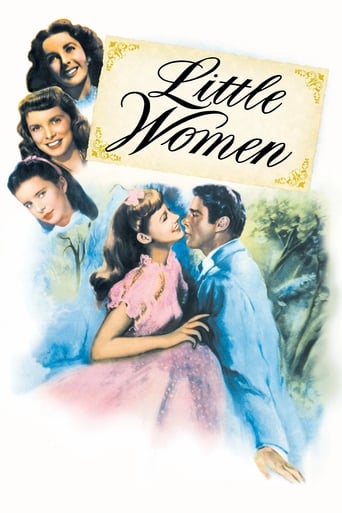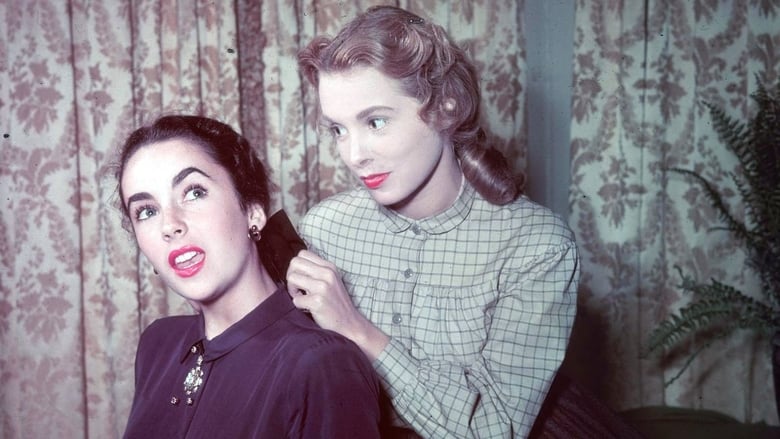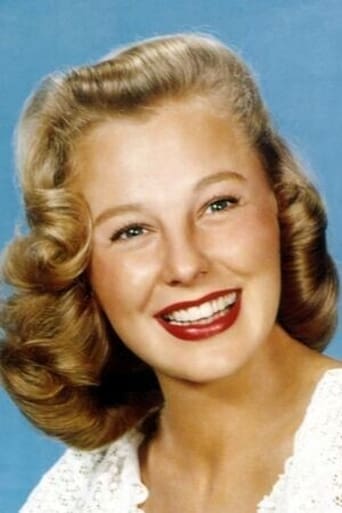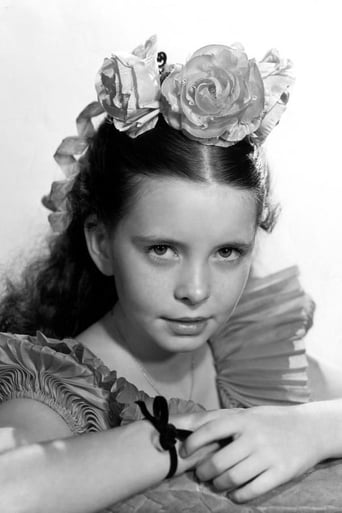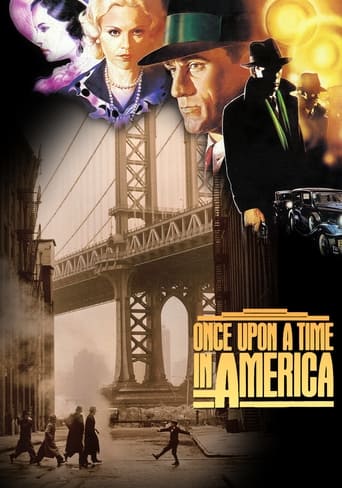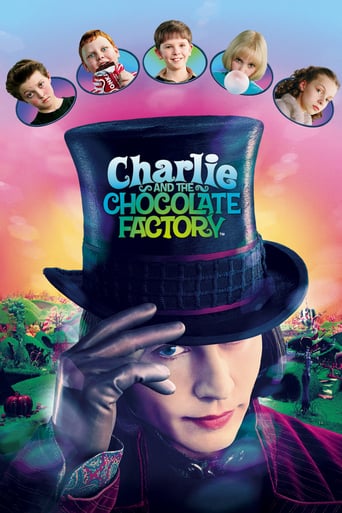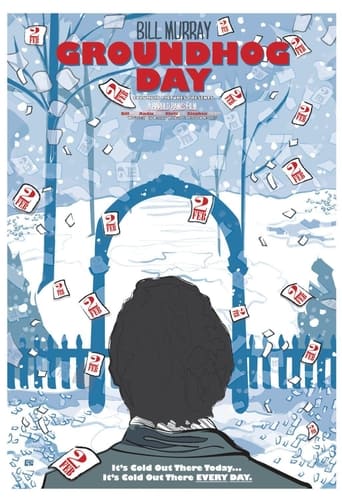Little Women (1949)

Louisa May Alcott's autobiographical account of her life with her three sisters in Concord Mass in the 1860s. With their father fighting in the civil war, the sisters: Jo, Meg, Amy and Beth are at home with their mother - a very outspoken women for her time. The story is of how the sisters grow up, find love and find their place in the world.
Watch Trailer
Cast


Similar titles
Reviews
I've lived bed this book and the 1949 movie since I was a little girl so I thought there would be no reason to watch this. It pulled me in right away, and even added some elements of the story missing from other adaptations. Actually got me excited to reread the book. I thoroughly enjoyed it and thought it was well cast
MGM's Technicolor remake of RKO's 1934 adaptation of Louisa May Alcott's timeless tale about four sisters on the Civil War home front, enacted by an all-star cast. June Allyson is a decent Jo; she doesn't attempt to make the part an iconic role, she's just gaily doing her duties as a Metro contract player. Elizabeth Taylor's self-centered Amy gets the lion's share of the funny lines, while Margaret O'Brien is typecast as the wilting Beth, glowing with spunky impertinence even while at death's door! Peter Lawford is well cast (for once) as Jo's cast-off 'Laurie', while Rossano Brazzi is surprisingly warm and nervously friendly as the professor who helps writer Jo get her work published. The picture has a feel-goodness about it which touches a lot of viewers, yet this familial unit isn't entirely convincing, and the fussy decoration and studio gloss turn the scenario into an artificial world of hugs and kisses. **1/2 from ****
After 1918, Little Women was made for the large screen in 1933, 1949, and 1994. The truest adaptation – that is, true to Louisa May Alcott's book – seems to be made by George Cukor in 1933. That one, the starkest of the three, is the only version filmed in black and white. Among other stars it features Katherine Hepburn, Joan Bennett, and Spring Byington. The 1994 version, with Winona Ryder, Claire Danes, and Susan Sarandon, is colorful but not exactly a close adaptation. There is also a bit of late twentieth century cynicism; note Sarandon's feminist expounding. While all versions are enjoyable to watch, this writer's personal preference is the rather loose adaptation of 1949, which features Janet Leigh, Elizabeth Taylor, June Allyson, and Margaret O'Brien.The story involves four loving sisters and their mother on the home front (picturesque Concord, MA) during the Civil War (circa 1863, but the story continues after the war). The indomitable Mrs. March ("Marmee" played by Mary Astor) does all she can to hold together her family while her spouse, a Union chaplain, is away. Sacrifices are made: firewood and lamp oil are scarce. An incongruity is that an attractive multi-level house, nice dresses, food aplenty, and a servant/cook seem to pass for near poverty. But, never mind. Among the sisters there are squabbles and scrapes, but also forgiveness and love. Jo March (June Allyson) is tomboyish and would fight on the battlefront for the Union if only she were allowed. A talented writer-to-be who loves literature, she is spirited, independent, and clumsy. Not wanting to see any family changes (conservative), she cries "Christopher Columbus" often. Meg (Janet Leigh), the oldest, is very beautiful. When Marmee is away, Meg, always proper and engaging, runs the household. Amy (Elizabeth Taylor) is attractive enough – but, unlike Meg – is also self-centered. She often confuses words, and likes to eat. The ill-fated Beth, played by Margaret O'Brien, is sweet and fragile. The youngest and shyest, she is frequently in ill-health (unlike Beth in the Alcott version where Amy is the unfortunate one).There are quite a few characters, some of whom we will touch upon here. There is cantankerous Aunt March (Lucile Watson), a rich, opinionated, and temperamental widow, who disproves of the March family's less than rich-status and their humane ways. She abhors Meg's engagement to impoverished John Brooke. Theodore "Laurie" Laurence (Peter Lawford), a genuinely nice person with charm, lives next door to the girls in a mansion with his grandfather. Laurie's mother, an Italian musician, was not loved by his grandfather. Although Laurie's later marriage proposal is turned down by Jo, he is destined to find true love with another sister. James Laurence (C. Aubrey Smith) is Laurie's grandfather who is tough on the outside but melts on the inside when he meets the respectable and appealing March girls. Leon Ames plays Mr. March, who appears later in the movie. Professor Friedrich "Fritz" Bhaer (Rossano Brazzi), who later falls for Jo, plays an amiable German immigrant who once had money but is now rather broke.Sure this 1949 version is rather loose, and the film is glossy; everything looks so pristine and colorful. For one thing, the girls always have neat hair and clothing (well, except for Jo, who stands too close to the fire!). Then again, the period of the 1860s was nowhere as sanitary as today, and we do not see any such things as chamber pots (thankfully). But the picture-postcard cinematography and set-decorations of 1949 are superior. Don't the season scenes remind one of Currier and Ives prints? If you can, freeze the frames of the multi-colored general store and see how everything is nattily arranged. The music score is pleasant and never overwhelming. June Allyson may be too old for her part and the girls do not seem to age over a four or five-year period, although most are about the right age at the story's end. The characters are certainly well-developed, and the innocence and flavor of a bygone era are nicely depicted. While the 1949 movie is a favorite, all three major versions are worth watching by anyone. Ignore the "chick flick" argument. After all, these ladies struggle to find their places in the world; they have their hopes and dreams and failures and successes. Will the three oldest sisters find love in the long run? It is worth watching to see how it all turns out in the end.
The book "Little Women" is one of my favourite books of all time, it is funny, moving and just makes me warm inside while reading it. This 1949 film is very delightful and charming with some good performances, lush cinematography and visual detail and lovely music. However, as I am sure people have pointed out, it is very loosely based on the book. Beth is now the youngest, Laurie goes off to war here and there are bits cut out. The latter is understandable though because the book is quite long. Putting all that aside, this is still a delightful film. It looks lovely, with lush cinematography and colourful costumes and scenery. The music is also gorgeous, I particularly loved hearing "None But the Lonely Heart", that is one of my favourite songs and never fails to bring tears to my eyes. The acting in general is very good, Janet Leigh isn't given that much to do but she is very rosy-looking as Meg. You may argue that June Allyson was too old for Jo, in some ways that is true. However Allyson still manages to give a warm and tomboyish performance. Elizabeth Taylor is wonderful as spoilt, selfish Amy, Taylor is not the lovely woman she is in "Ivanhoe" or the seductive "sex on wheels" character she is in "Cat on a Hot Tin Roof", she is Amy and plays her very convincingly, making the most of some of the film's best lines. That leaves Margaret O'Brien, a very cute and appealing child actress, and she was very convincing as Beth, Beth's vulnerability in the latter half of the film is genuinely affecting. Out of the supporting actors, Mary Astor comes off best, sticking to the benevolent and sincere Marmee of the book, and C.Aubrey Smith is splendid as Old Mr Laurence, his scenes with Beth are quite heart-warming. Peter Lawford is charming as Laurie, and Lucille Watson is quite detestable as Aunt March. Rossano Brazzi as Professor Bhaer looks handsome, but I wasn't entirely convinced by him. He started off wooden, and I also felt he was too Italian for the role, Professor Bhaer is supposed to be German. Still, "Little Women" despite its flaws is still a delightful and charming film. 8/10 Bethany Cox

